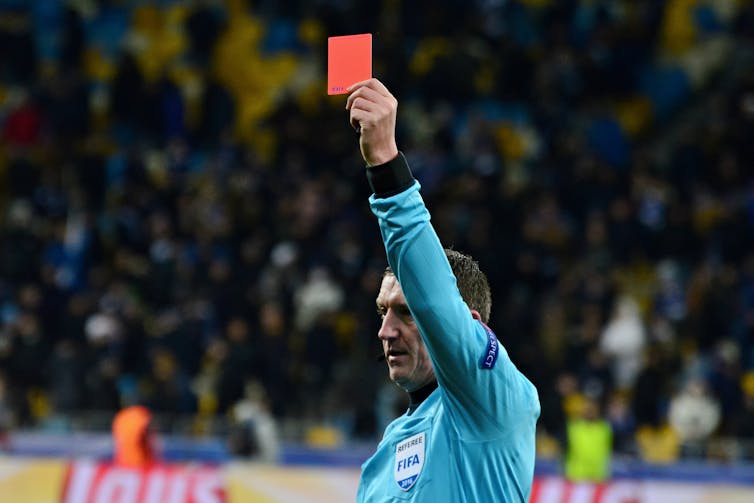
Professional boxing is no stranger to controversy. The British Medical Association, the trade union for doctors in the UK, has called for years for the sport to be banned due to its damaging effects. It has a higher potential for injury than any other contact sport.
Boxing encourages participants to knock out their opponent. Such conduct often involves the deliberate infliction of grievous bodily harm. Outside of the ring, this conduct could land you with a prison sentence. When boxers break the rules of a contest, there is also the potential for criminal charges.
Infamously, US boxer Luis Resto spent time in prison for assault after replacing the padding in his gloves with plaster before a 1983 fight. This seems like an obvious case for prosecution, but the line is not always so clear. Now, a doping scandal has raised the question: how does the law decide when sports violence or misdemeanours become criminal?
In October, welterweight contender Conor Benn failed two drug tests ahead of his highly anticipated bout with Chris Eubank Jr. A fighter failing a doping test is nothing new. But this information was revealed in a tabloid days before the fight, suggesting that without the exposé, the bout would have gone ahead.
Benn has maintained his innocence, but voluntarily relinquished his boxing licence in the weeks following the tests. This sidestepped a full misconduct hearing, in a move that some queried.
In response, boxer and commentator Spike O'Sullivan has called for steroid users to be charged with attempted murder. But in cases of sporting foul play, it’s not always obvious when the criminal courts should intervene.
Sports cheat or violent criminal
Luis Resto’s case was clear cut. The victim, Billy Collins Jr, did not consent to the specific risks associated with fighting an opponent with “loaded gloves” just by taking part in the boxing match.
When it comes to other forms of cheating, the legal response has been murkier.
One example is the 2004 case R v Barnes, where a footballer appealed his conviction for grievous bodily harm inflicted on an opponent during a match. He performed a hard and high sliding tackle but maintained that the injury to his opponent’s leg was accidental.
The court of appeal overturned the conviction, reasoning that by taking part in a legitimate sport, someone effectively consents to the risk of injury, insofar as it is incidental to the game. This provides a potential defence for the accused, even if they broke the sport’s rules (for example, by fouling another player).
What remains unclear is what behaviour (including cheating) is actually incidental to “legitimate sport” – an important factor that depends on context.
Courts have intervened when competitors have engaged in “off the ball” violence. Footballer Eric Cantona was convicted of assaulting a fan during a match by leaping into the crowd and executing a “kung-fu kick” in 1995.

The Barnes case was concerned with tackles and foul play during a game, rather than preemptive cheating to maximise one’s potential to inflict serious injury ahead of a contest. Luis Resto’s gloves would fall under the latter category, but performance-enhancing drugs are a grey area. Neither the UK courts nor parliament have paid close attention to the boundaries of the consent defence in such circumstances.
Interestingly, in the now hypothetical case of Benn and Eubank Jr, it was reported that Eubank Jr was happy to proceed with the contest despite his opponent’s positive test: “I’ve prepared, I have done my job and now it is in the hands of the promoters, the governing bodies to make this fight happen. All I can do is be ready.” In such dangerous circumstances, it is questionable whether any prior consent could provide a defence to a subsequent charge of serious violence.
Why is boxing legal, anyway?
Legally, boxing rests on shakier foundations than other sports. Boxing originally appears to have been regarded as lawful not through any application of principle, or by reference to the legal rules applying to other sports. Rather, it appeared to 19th-century judges to be tamer than the bare-knuckle prizefights they were keen to outlaw. This exceptional category of legally permissible violence has endured only because of its popularity – no government has (yet) seen fit to ban it.
Professional and amateur boxing are also regulated. Bouts have referees, padded gloves, weight classes and other rules to mitigate medical risks to participants. The courts have found that, due to these factors, consensual boxing would be a “legitimate sport”, exempt from the ordinary operation of criminal laws prohibiting serious violence.
Unlicensed forms of boxing, such as white collar contests and resurgent bare-knuckle boxing are not so clearly exempt. The position of other combat sports such as Thai boxing and mixed martial arts is also uncertain. These are subject to varying degrees of regulation, and the senior courts in England and Wales have simply not yet had the opportunity to definitively rule on their lawfulness.
Joe Purshouse does not work for, consult, own shares in or receive funding from any company or organization that would benefit from this article, and has disclosed no relevant affiliations beyond their academic appointment.
This article was originally published on The Conversation. Read the original article.







